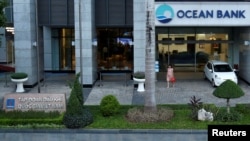Vietnam opened a major corruption trial Monday against defendants who include a former senior Communist official and a former oil executive the Vietnamese government is accused of snatching from Germany.
Former Politburo member Dinh La Thang, 57, also was formerly the chairman of state energy giant PetroVietnam and is accused of "deliberately violating state economic management regulations, causing serious consequences'' for his role in awarding PetroVietnam's Construction Joint Stock Company, or PVC, a contract to build a thermoelectric plant without a proper bidding process.
He allegedly also advanced $67 million to PVC, which did not use the funds for the right purpose, causing losses of $5.5 million to the state.
Thang, the first former Poltiburo member to face prosecution, faces up to 20 years in prison if convicted.
Trinh Xuan Thanh, 51, a former chairman of PVC, is accused of the same charge as well as embezzling $186,000 from another thermoelectric plant. The embezzlement offense carries the death penalty.
In August, Germany accused the Vietnamese intelligence service of kidnapping Thanh from a Berlin park. Vietnam denied that, saying Thanh turned himself in to police voluntarily, but the incident strained bilateral ties and Germany expelled two Vietnamese diplomats.
The trial Monday involves the two men and 20 other defendants who are mostly current or former senior oil executives, including three other former chairmen of PetroVietnam.
PetroVietnam and the banking sector have been at the center of an unprecedented crackdown on corruption under the watch of the Communist Party's General Secretary Nguyen Phu Trong, who was re-elected to another five-year term in early 2016 at the party congress.
The trial
The trial of Thang and Thanh "sends out a stern warning that there will be no 'no-go zones' in this campaign, and corrupt officials, no matter who they are and what position they hold, will be brought to justice,'' said Le Hong Hiep, a research fellow at the Singapore-based ISEAS - Yusof Ishak Institute.
"The campaign has some aspects of political infighting, but the main driver is still the Party's wish to stem widespread corruption, which has undermined the people's confidence in the Party's governance capabilities as well as its economic reform efforts,'' Hiep said.
He said political power had previously been fragmented and the fight against corruption inefficient, but Vietnam's political power structure was now concentrated in favor of the general secretary position. The corruption crackdown was intensifying now because Trong and his allies were able to consolidate power after the party congress, Hiep said.
Once a rising political star, Thang was dismissed from the all-powerful Politburo in May and was subsequently fired as secretary of the southern commercial hub of Ho Chi Minh City. He was arrested on Dec. 8 while his brother Dinh Manh Thang was detained one day later for alleged embezzlement in another corruption case.
Hiep said the trial of Thanh will continue to have a chilling effect on relations between Vietnam and Germany and may affect the free trade agreement between Vietnam and the European Union.
"The EUVFTA may be delayed, but I believe it will eventually be ratified by the EU, especially if the trial of Mr. Thanh is seen as transparent and fair. In the end, economic considerations may outweigh political ones in this case,'' he said.
Security around the court house in central Hanoi was tight.
"I'm happy that the government is getting tough on corruption with the trial of Mr. Thang, a former Politburo member,'' said Ngo Quang Hung, 62, a retiree, who was among few dozen people gathered outside the courthouse. "But the anti-corruption crackdown will not be a successful one if corrupt money is not retrieved back to the state.''
The trial in which foreign media is not allowed to attend is expected to last two weeks.
Vietnam ranks 113 out of 176 countries in Transparency International's 2016 corruption index.







